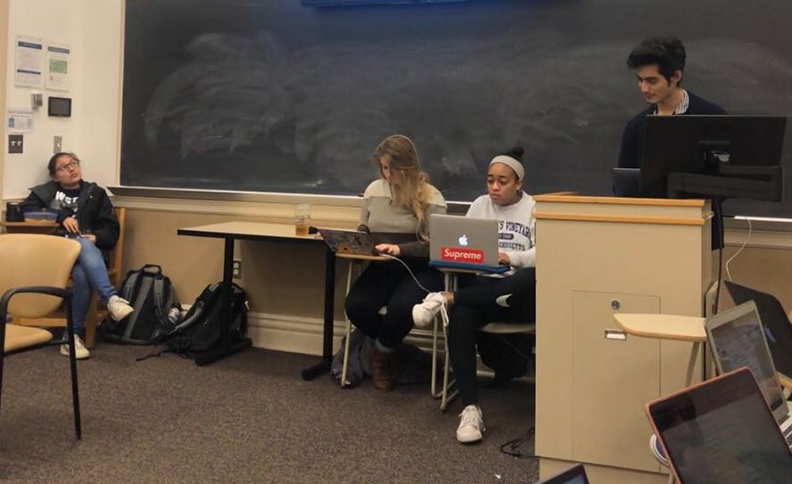Many Georgetown University Student Association members have missed their GUSA bystander training sessions, GUSA Vice President Aleida Olvera (COL ’20) said at the weekly meeting of the GUSA senate Monday.
Starting this year, GUSA executive members are required to attend a bystander training session run by the university’s Health Education Services to educate individuals on how to safely intervene in potential incidents of sexual violence, according to Olvera. GUSA senate members were not required to go to the meetings but were invited by the executive, according to Senate Speaker Juan Martinez (SFS ’20).

Members of the GUSA executive cabinet agreed to do the trainings when they joined the executive branch, according to Olvera. The GUSA executive plans to enforce consequences against executive members who do not attend the trainings, according to Olvera and President Norman Francis Jr. (COL ’20).
“The way that we plan to enforce this is that the members who do not attend Bystander training will be forced to make note of this on the GUSA Directory and GUSA website,” Francis and Olvera wrote in an Oct. 31 email to The Hoya. “They will have a mark on their names that indicates that they were not bystander trained.”
Sixty-eight GUSA members indicated they would attend one of the three offered bystander trainings, according to Martinez. Of those 68 sign-ups within GUSA, only 26 members were present at the actual trainings. There were a total of three GUSA-specific trainings, one Nov. 22 and two Nov. 24.
For a full-time staff member of the university’s Health Education Services to lead a bystander training, a minimum of 10 students is required, according to Olvera. While 11 individuals signed up for the single training Nov. 22, the training was canceled, since only two senators and two executive members showed up. The two sessions held on Nov. 24 ran, but only 12 participants attended the first session, and only 11 attended the second, according to Olvera.
The GUSA senate has considered requiring the trainings, however, senators were only recently informed about the sessions, according to Martinez.
“While Senate leadership strongly encouraged senators to attend these trainings, we were only informed of these trainings a few weeks before they were set to occur,” Martinez wrote in an email to The Hoya. “As a result, it would not have been fair to make them mandatory as many students already had plans to travel that weekend.”
Canceling the Nov. 22 training because of low turnout was disappointing, according to Senator Daniella Sanchez (COL ’20), who was one of the three GUSA senators who showed up for the training.
“I was not able to attend the Sunday sessions, so I’m not sure how that turnout was, but the way Aleida was speaking, we could tell that it wasn’t sufficient,” Sanchez said.
Some senators may not have been able to attend the sessions because of the close proximity to the Thanksgiving holiday, according to Senator At-Large Charlie Wang (SFS ’22).
“I think the main reason is that it’s just the week before Thanksgiving and people are slacking a little bit,” Wang said. “But I think in general, I think GUSA is trying to address these kinds of issues, and it’s important to address these kinds of issues as well.”
The new bystander trainings are intended to prevent sexual misconduct in GUSA, according to Sanchez.
“It hasn’t been implemented like this before,” Sanchez said. “This is a new step that the administration is trying to take to show that GUSA is trying to be proactive in preventing any issues from arising within the senate. This is the first time that this many sessions have been provided for GUSA exclusively.”
Former Vice President Naba Rahman (SFS ’19) and 10 other executive cabinet members resigned Sept. 11, 2018, to put pressure on then-GUSA President Sahil Nair (SFS ’19) to resign amid sexual misconduct allegations against him. Later that morning, Nair resigned. After an emergency GUSA senate meeting that night, senators demanded all of the resignations be upheld. Rahman and the remaining cabinet members officially resigned Sept. 14, 2018.
The implementation of these trainings is also meant to combat the negative reputation of GUSA in matters of sexual assault and misconduct after last year’s events, Olvera said during the senate meeting.
“I don’t even want to beat around the bush — the sentiment towards GUSA is that we’re full of people who perpetuate sexual assault and violence against women,” Olvera said at the meeting.
To respond to the attendance problems for these trainings, GUSA is set to hold rescheduled trainings next semester, according to Olvera.
“We do want to show the student body that we are a different GUSA,” Olvera said at the meeting. “We have this ugly sentiments towards us because we have never shown ourselves or proven ourselves to be different, and this was our opportunity to do so. So I’m really disappointed that there was not a lot of people there.”
CORRECTION: This article has been updated Dec. 6 to clarify that the trainings are only mandatory for members of the GUSA executive branch. The article was also updated to clarify how many senators attended the Nov. 22 training.




















